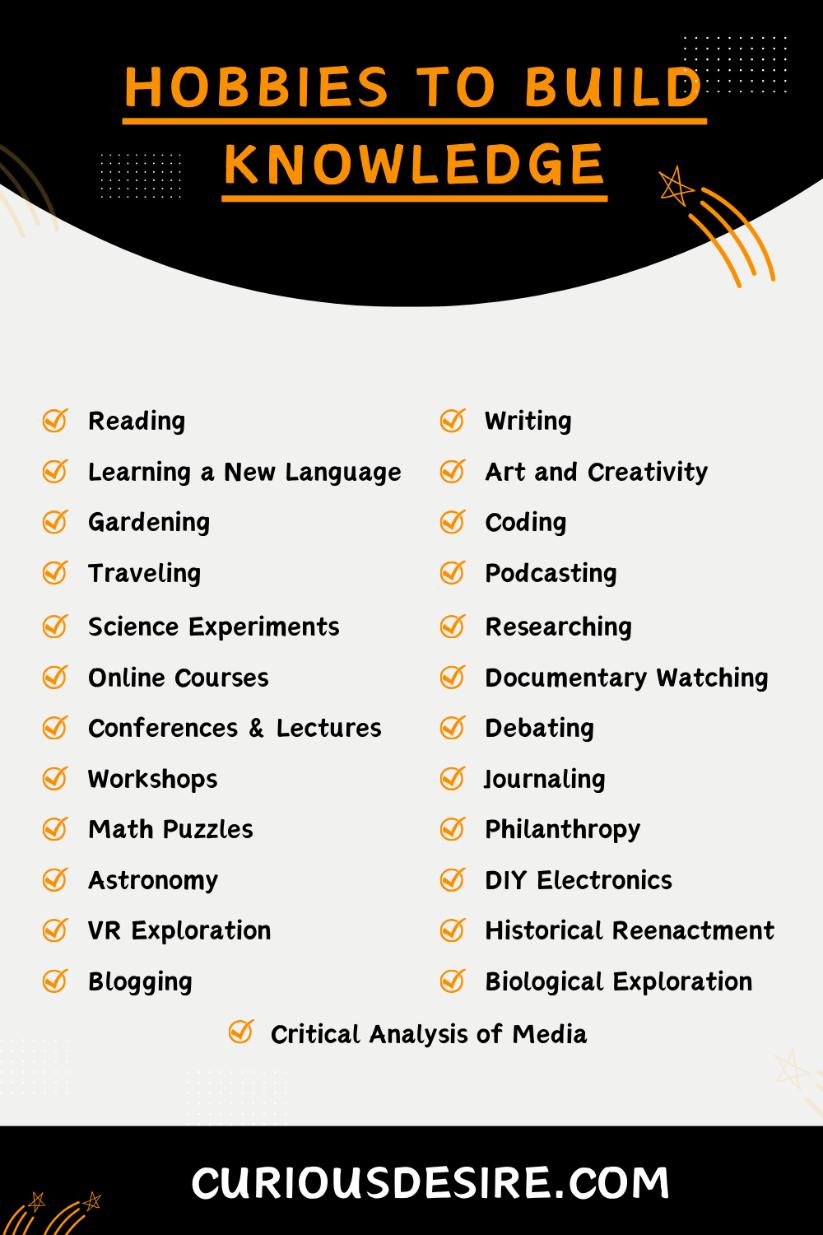We all seek a break from the monotony of work or educational routines. However, free time often calls for fun activities.
But what if these activities could also be a source of learning and knowledge? Well, dear readers, it’s possible!
In this article, I’ve compiled a list of hobbies that promise both enjoyment and education.
Let’s explore these options together and transform your leisure time into a delightful learning experience.
Let’s get started!
Here are the top 5 amazing hobbies to build knowledge:
- Coding and Programming
- Podcasting or Public Speaking
- Researching
- Debating or Discussion Groups
- Participating in Workshops
[toc]

Hobby 1: Reading
Reading is a versatile and fundamental hobby that involves engaging with various written materials such as books, articles, and other literary works.
By engaging with a diverse range of genres and topics, individuals can significantly broaden their understanding of the world.
Fictional works can offer insights into human nature, cultures, and societal dynamics, while non-fictional materials can provide factual knowledge on specific subjects.
Reading not only stimulates the mind but it also helps you think carefully and analyze things better. This makes it a strong way to learn and gain knowledge.
Hobby 2: Writing
Expressing thoughts through writing is a creative and intellectually enriching hobby. Trying one’s hand at fiction or non-fiction writing allows individuals to deepen their understanding of different subjects.
It enhances communication skills, encourages self-reflection, and can even lead to the discovery of new perspectives and insights.
Hobby 3: Learning a New Language
Acquiring a new language goes beyond the mere act of communication; it opens up doors to different cultures and perspectives.
When you learn a language, you understand how it’s put together – the grammar, words, and little details.
This helps you see the history and culture of the people who speak it.
It also makes your brain work better, improves your memory, and makes you appreciate the different ways people use language.
Hobby 4: Art and Creativity
Through artistic expression, individuals can gain insights into emotions, perspectives, and cultural representations.
It stimulates the imagination, encourages problem-solving skills, and provides a unique way to explore and convey ideas.
Hobby 5: Gardening
Gardening is a hands-on hobby that involves cultivating plants and providing practical knowledge about biology, ecology, and environmental science.
It allows individuals to understand the growth cycles of plants, the importance of soil health, and the delicate balance of ecosystems.
Gardening also helps you feel more connected to nature, making you care more about the environment and ways to take care of it in the long run.
Hobby 6: Coding and Programming
Learning to code is a hobby that opens up a world of technological understanding and problem-solving skills.
Coding encourages logical thinking, algorithmic reasoning, and the ability to create functional solutions to real-world problems.
It provides insights into the foundations of software development, computational thinking, and the ever-evolving field of technology.

Hobby 7: Traveling
Exploring new places is a hobby that exposes individuals to different cultures, histories, and ways of life, broadening their perspective.
Traveling provides firsthand experiences and interactions with diverse environments, providing cultural awareness, adaptability, and a global mindset.
It offers opportunities to learn about history, geography, and the interconnectedness of the world.
Hobby 8: Podcasting or Public Speaking
Creating and presenting content through podcasts or public speaking is a hobby that improves communication skills and encourages in-depth research on various topics.
It involves the development of effective storytelling, research, and presentation abilities.
Engaging in podcasting or public speaking enhances one’s ability to convey information clearly and persuasively.
Hobby 9: Science Experiments
Conducting simple scientific experiments at home is a fun and educational way to explore various scientific principles.
This hobby allows individuals to apply theoretical knowledge, develop hypotheses, and observe real-world outcomes.
Doing these experiments helps you stay curious, think carefully about things, and understand how scientists figure out how the world works.
Hobby 10: Researching
Engaging in independent research involves exploring topics of interest using reputable sources, academic papers, and books.
This hobby encourages individuals to develop research skills, critically evaluate information, and synthesize knowledge.
It deepens understanding and allows for the exploration of niche subjects or the pursuit of expertise in a specific field.
Hobby 11: Online Courses
For those who are always eager to learn new things, one fantastic way to acquire skills is by taking online courses.
Enrolling in online courses or MOOCs (Massive Open Online Courses) gives you a clear plan to learn about specific subjects.
Websites like Coursera, edX, and Khan Academy have many courses on different topics.
This learning hobby helps you follow a step-by-step approach, develop new skills, and access educational content led by experts in the field.
It’s like having a structured path to gaining knowledge and becoming skilled in various areas.
Hobby 12: Documentary Watching
Exploring documentaries on platforms like Netflix, National Geographic, or YouTube offers a visual and informative way to learn about various subjects.
Documentaries cover a wide range of topics, from science and history to culture and technology.
Watching documentaries enhances visual learning, complements theoretical knowledge, and provides real-world examples.
Hobby 13: Conferences and Lectures
Attending conferences, seminars, and lectures, either in person or online, provides opportunities to learn from experts in a particular field.
By participating in conferences and lectures, you not only get to network with people who share your interests but also expose yourself to new ideas and advancements in different fields.
Hobby 14: Debating or Discussion Groups
Getting involved in debating or discussion groups, whether by joining existing ones or forming new ones, is more than just a pastime – it’s a way to dive deep into conversations about current events, philosophy, or anything you find interesting.
This hobby sharpens your ability to think critically, makes you better at expressing yourself, and pushes you to explore different points of view through meaningful conversations.
It’s like a workout for your mind that helps you become more skilled in thinking and communicating effectively.
Hobby 15: Participating in Workshops
Participating in workshops goes beyond just learning; it’s about getting hands-on experience and practical know-how.
Workshops are like interactive learning sessions where you can put into practice what you’ve learned theoretically.
This not only helps you develop practical skills but also deepens your understanding of specific topics.
It’s a way to bridge the gap between theory and real-world application.
Hobby 16: Journaling
Hobby 17: Math Puzzles and Games
Engaging in the hobby of solving challenging math puzzles or playing strategic math games is a way to boost your mathematical skills and logical reasoning.
This intellectually stimulating activity goes beyond numbers; it sharpens critical thinking and instills a genuine appreciation for mathematical concepts.
It’s like a playful exercise for your brain that not only makes learning math enjoyable but also enhances your overall cognitive abilities.
Hobby 18: Philanthropy and Social Impact
Getting involved in philanthropic activities or social impact projects is a hobby that provides insights into social issues, community development, and humanitarian efforts.
All this contributes to a deeper understanding of societal challenges and the impact of collective actions.
Hobby 19: Astronomy and Stargazing
Engaging in the hobby of astronomy and stargazing involves exploring the nighttime sky, studying constellations, and the wonders of the cosmos.
This hobby provides profound insights into the vastness of the universe and our place within it.
Stargazing is more than just looking at the stars; it sparks a natural curiosity about celestial objects, including planets, stars, and galaxies.
This hobby nurtures an interest in various astronomical phenomena, such as meteor showers, eclipses, and planetary alignments.
It also invites individuals to grasp the fundamental principles of astrophysics, offering a glimpse into the mechanics that govern the celestial bodies.
Hobby 20: DIY Electronics and Robotics
Participating in the hobby of DIY electronics and robotics is a hands-on venture that goes beyond typical learning—it’s about actively building and experimenting with electronic projects.
By working on DIY electronics projects, individuals gain practical skills in understanding how electronic components come together to create functional systems.
Additionally, exploring robotics introduces enthusiasts to the world of automation, where they can learn about designing and programming robots.
Beyond the technical aspects, this hobby sparks creativity as individuals design and build their technological solutions.
Hobby 21: Virtual Reality (VR) Exploration
Engaging in the hobby of Virtual Reality (VR) Exploration takes learning to a whole new level.
This unique pastime enables individuals to explore educational content in a virtual environment.
What sets this hobby apart is its interactive nature. Users can actively participate and manipulate the virtual environment, making the learning experience more engaging and memorable.
Hobby 22: Historical Reenactment
Being part of historical reenactments is like stepping back in time. It’s not just learning about history; it’s actually experiencing what life was like in the past.
In this hobby, people get into the spirit of different historical periods. They dress in the clothes people wore back then, use tools from that time, and live like they did in those days.
By doing all this, individuals get a real feel for what life was like in the past. It’s a way to touch and experience the challenges and details of everyday life back in history.
Hobby 23: Blogging
Blogging is a creative outlet that involves regularly writing and publishing content on a personal website.
This hobby allows individuals to share their thoughts, experiences, and expertise on specific topics, contributing to online discourse and community building.
Hobby 24: Biological Exploration
Biological exploration involves hands-on activities related to the study of living organisms.
This could include exploring nature reserves, observing wildlife, or conducting experiments in the field.
This hobby enhances knowledge of biology, ecology, and biodiversity.
Hobby 25: Critical Analysis of Media
Getting good at critically analyzing news, articles, or media content is more than just a skill—it’s like a hobby that sharpens your understanding of what’s happening around you.
This hobby involves looking at information carefully, questioning what you read or see, and thinking about things from different points of view.
By developing this analytical skill, you not only stay informed about current events and issues but also become more aware of the world around you.

